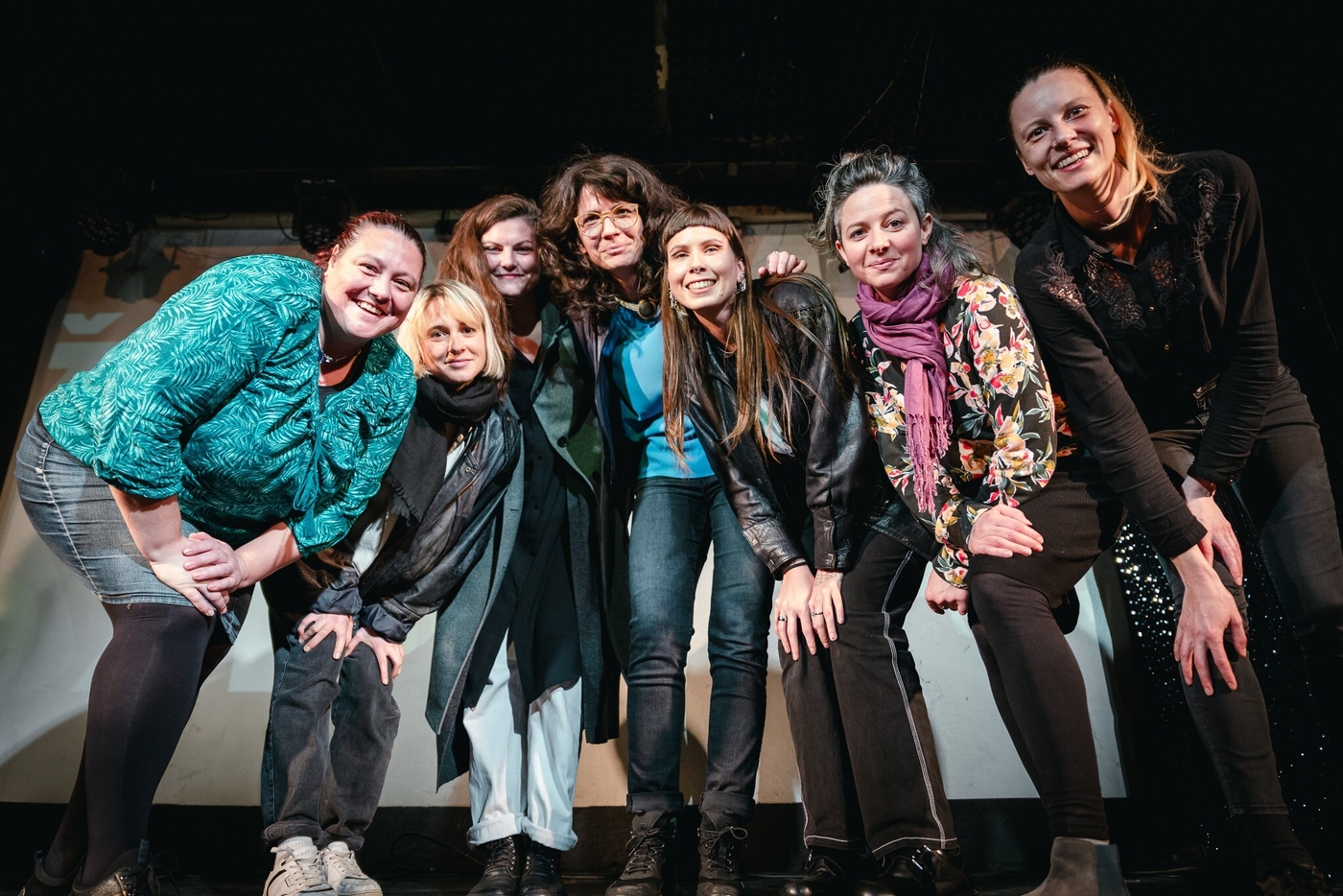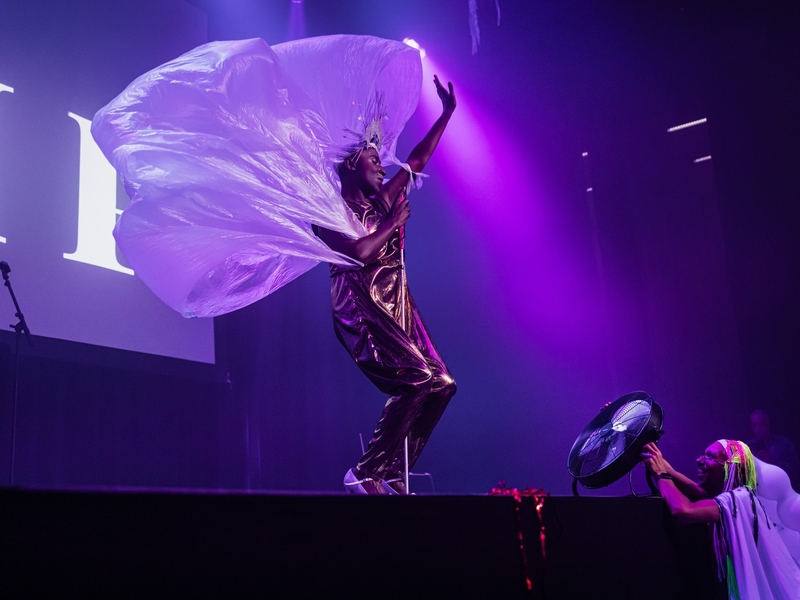International Women's Day - Interview with the City of Women Festival
In honour of International Women’s Day, we highlight the City of Women - International Festival of Contemporary Arts. International Women's Day is an occasion to celebrate women and review how far they have come in the struggle for equality, liberty, and development. We talked to Iva Kovač, Programme Director of the City of Women Association.

Interview
Tell us about you. How did you come to be involved in the City of Women, International Festival of Contemporary Arts?
City of Women, International Festival of Contemporary Arts is the first big-scale festival I worked on. I applied to an open call and have been working with the organisation for three years now. It was a big adjustment moving to Slovenia during Covid times. City of Women is an interdisciplinary festival and since I came from the Visual Arts sector, I had a lot to learn.
How do you see gender equality in the festival scene?
Only ten years ago, exhibitions tackling gender equality in big institutions were a rarity. Recently, there has been a more prominent focus on women and gender equality within the arts field. The question of whether this is merely a short-lived focus or a real push towards gender equality in our culture remains. It is important to keep gender equality as a priority on all levels of cultural production.
Can you tell us more about the 30th edition and the jubilee’s theme - SISTERHOOD and UNITY?
Thirty years ago, the first edition of the City of Women festival was created by the Government Office for Women’s Policy. In independent Slovenia, during the first years after the dissolution of Yugoslavia, gender equality was on the decline. The festival's task was to promote gender equality in society at large through culture. This is still the mission of the City of Women Association, which has been organising the festival since its second edition.
With a focus on women and gender minorities, the 30th edition is all about sisterhood. We don’t approach sisterhood as an essential connection between women, but rather as a concept and a proposition for a changed relational paradigm. The working title of the festival ‘Sisterhood and Unity’ is a paraphrase of the socialist Yugoslav slogan “Brotherhood and Unity” which promoted cross-ethnic affiliation in a multiethnic state. The “Sisterhood and Unity” adheres to the positive aspects of the former slogan while reconceptualising it around issues of care and solidarity. ‘Sisterhood and Unity’ is a very open concept that can be contributed to from different angles. My co-selectors Ana Lorger, Brigita Gračner and Sara Šabec have contributed to this concept by selecting segments of the programme with their own points of view and understanding of the theme.
Which part of your job do you like the most?
There are a lot of different aspects of my job that I like. The moment when the festival is unravelling is as exciting as it can be stressful. It is also a moment of heightened connection between colleagues. I love working with my team and connecting with the artists that participate in the festival and the audience.
I also enjoy the preparations for the festival and the research that comes with it. Putting everything together as one final piece and creating a dialogue between the team and the artists. Harmonising with my colleagues that each work on different parts of the festival is definitely one of the highlights of my job.
Do you think women have (enough) space in the arts, specifically in Slovenia compared to other countries?
Nowadays, there is a bigger presence of women and gender minorities in the arts. More organisations, institutions and festivals promote the work of women and gender minority artists, are creating events focused on feminist issues, or both at the same time, as is many times the case. For the past few years, this has also been the case with some organisations and institutions in Slovenia that are not specifically focused on feminist issues. These events are certainly making amends for the history of the underrepresented.
However, gender equality is not achieved within the arts. Even if we can achieve equal representation, which is not the case now, we often see that with the feminisation of a specific discipline, certain disadvantages come along, such as lesser funding for projects. Some women and gender minority perspectives are continuously less visible, be that because of race, social class, different abilities or other debilitating personal factors that come into play in art making and presentation.
I am happy to see that changes are being made. I want these changes to be understood as examples of good practices to be incorporated into the way we organise events in the future — consistently addressing gender equality in an intersectional manner.
A glimpse into the programme of the 30th edition of City of Women – International Festival of Contemporary Arts.
SUKEBAN
A groundbreaking theatre production showcase by the City of Women and Cankarjev dom and directed by Varja Hrvatin.
Varja Hrvatin is a talented theatre director from Slovenia. Her upcoming production, tentatively titled SUKEBAN, delves into the empowering narrative of a girl gang inspired by the Japanese 'sukeban' phenomenon of the 1960s. Through this work, Varja Hrvatin challenges conventional gender norms and celebrates the resilience of rebellious young women.
Baque
An immersive guest performance by the Brazilian choreographer Gaya de Madieros.
Gaya de Madieros is an emerging talent in the world of choreography and dance, gaining recognition for her innovative work and unique artistic vision. Baque promises to be a celebration of affection and storytelling, presented by a collective of trans individuals, offering a unique and inclusive perspective.
Daughters of the Dust
A special screening of Julie Ethel Dash’s timeless masterpiece ‘Daughters of the Dust’.
Julie Dash, a celebrated American filmmaker, intricately weaves together Afrocentric culture and the emotional journey of black women in this captivating film. The film shows the rich world of the women of the Peazant family at the turn of the 20th century facing a hard choice to stay in the American South or move North.
Picture: COW team left to right Urška Jež, Ana Lorger, Sara Šabec, Iva Kovač, Katja Lenarčič, Eva Prodan, Mišel Miheljak. By: Asiana Jurca Avci


